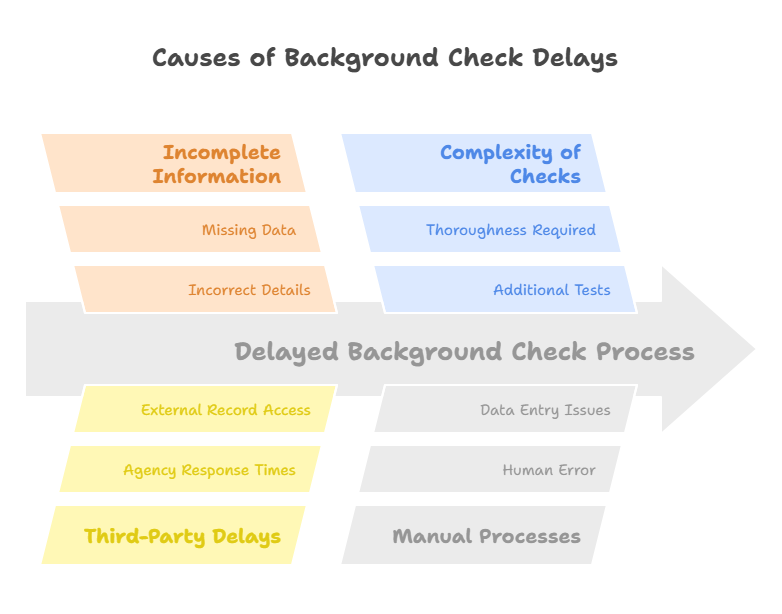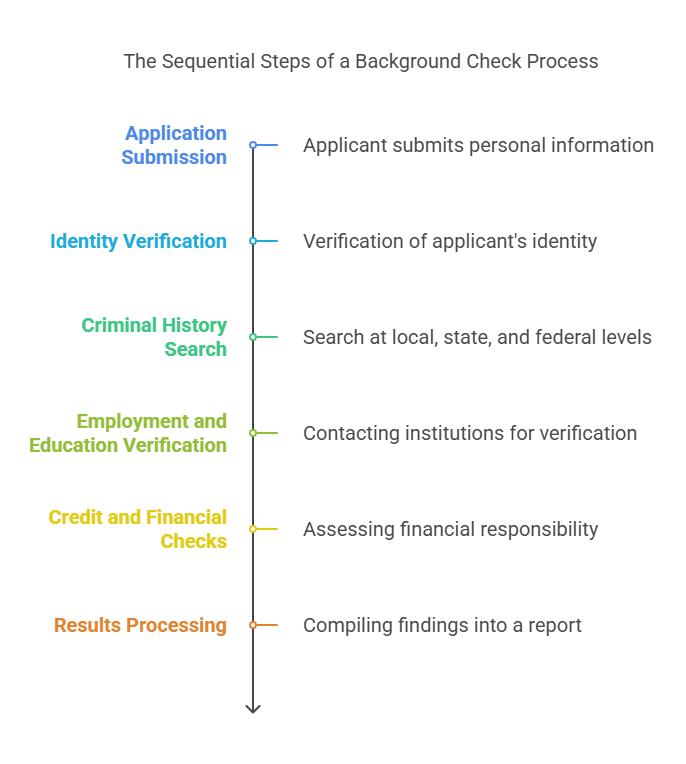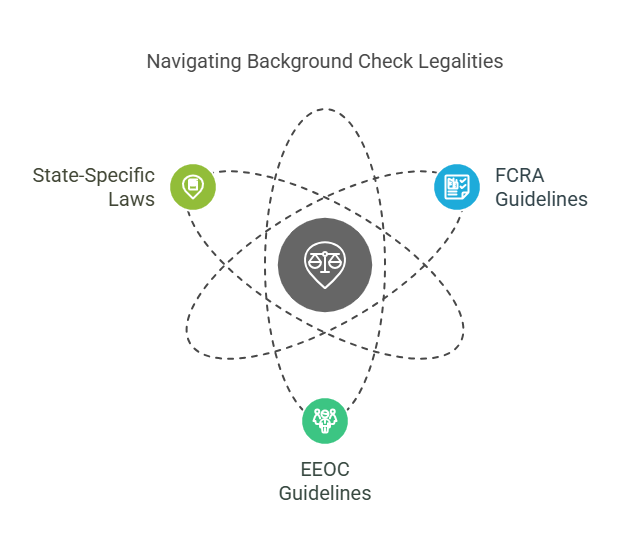Common Reasons for Background Check Delays

Introduction and Common Reasons for Background Check Delays
A background check is a process used by employers, landlords, or other organizations to verify information about an individual before making important decisions, such as hiring, renting, or granting access to certain privileges. It serves as a tool for assessing an applicant’s trustworthiness, character, and suitability for a particular role or responsibility.
Background checks typically involve reviewing a person’s criminal history, employment history, education records, credit score, and sometimes drug testing or other health-related assessments. By conducting a background check, organizations aim to reduce risks, maintain safety, and comply with legal and regulatory requirements.
Common Reasons Why Background Checks Take a Long Time

While background checks are a standard part of many hiring processes, they can sometimes take longer than expected. Understanding the reasons behind these delays can help applicants manage their expectations and navigate the process more smoothly. Here are some common reasons why your background check may be taking longer than anticipated:
1. Incomplete Information or Inaccurate Details
One of the most common causes of delay is when the information provided by the applicant is incomplete, incorrect, or inconsistent. Background check providers rely heavily on the data submitted to begin their investigation, including names, dates of birth, addresses, and social security numbers. If there are discrepancies, it can cause delays as the provider may need to contact the applicant for clarification or further documentation.
For example, a minor mistake such as a misspelled name or a missing address can cause the process to stall, especially when performing criminal background checks, as they require precise identifiers to pull accurate records.
2. Discrepancies in the Report
Discrepancies found during the background check process can also lead to delays. For example, if there is a difference between the applicant’s resume and the employment records, or if a criminal record from another jurisdiction surfaces, the background check service may need more time to investigate the issue. These discrepancies can require additional verification steps or clarification from third parties.
In some cases, applicants may be asked to provide proof of employment, educational history, or a legal explanation for any past offenses. If these discrepancies are not resolved quickly, it can delay the overall timeline.
3. Third-Party Delays
Background checks often involve multiple third-party agencies, such as government databases, credit bureaus, and criminal record authorities. These agencies can experience delays in processing requests due to factors such as high demand, slow response times, or operational inefficiencies. If any of these agencies takes longer to provide the requested information, it can extend the background check process.
Additionally, if the background check service provider does not have direct access to certain records, it may need to rely on external agencies, which can introduce further delays. For instance, requesting criminal records from smaller, local police departments may take longer than requesting data from state or federal agencies.
4. Complexity of the Background Check
The complexity of the background check itself can also influence how long it takes to complete. Some positions or industries require more thorough checks. For example, roles in the financial sector may require a detailed credit report, while positions that involve sensitive information may necessitate security clearance checks or a more extensive criminal background check.
The more in-depth the check, the longer it will take to gather and verify all relevant data. A drug test or health screenings may add additional time to the process, especially if the results are sent separately or require extra verification.
5. Volume of Requests
Background check companies often experience delays when they are handling a high volume of requests. This can happen during peak hiring seasons or when many applicants are going through the process simultaneously. During times of high demand, these companies may take longer to process individual requests, potentially leading to delays.
6. Incomplete or Delayed Responses from Employers or Educational Institutions
Background checks often include verifying past employment or educational history, and delays can arise when the background check service is unable to reach past employers or educational institutions for verification. Organizations and institutions may take time to respond, particularly if they are understaffed, closed for holidays, or difficult to contact.
7. Manual Processes or Errors in Data Entry
While many background checks are automated, some aspects of the process may still involve manual review, particularly when discrepancies or issues arise. Human error during data entry or a manual review can slow down the process and cause delays in issuing the final report.
Overview of the Background Check Process

A background check typically involves several key steps, which can vary depending on the employer, industry, and position. Here’s a general overview of the process:
- Application Submission: The applicant submits their personal information, including consent to run the background check.
- Identity Verification: The background screening company verifies the applicant’s identity by cross-referencing provided data with public records.
- Criminal History Search: The criminal record search is conducted at local, state, and federal levels.
- Employment and Education Verification: The employer or educational institution is contacted to verify employment dates, roles, and academic credentials.
- Credit and Financial Checks: If applicable, credit reports are requested to assess the financial responsibility of the applicant.
- Results Processing: The background check service compiles and processes the findings into a comprehensive report for the employer.
Typical Time Frame for Background Checks
The time frame for completing a background check depends on the depth of the check and the factors mentioned earlier. On average, a standard background check can take anywhere from 3 to 7 business days to complete. However, more complex checks, especially those requiring employment verification or drug testing, can take 10 business days or more.
Applicants should expect to hear back about the results of their background check within a week or two, but it’s always best to confirm the expected timeline with the hiring company or background screening provider.
Factors That Can Cause Delays in Background Checks
Understanding the factors that can impact the speed of a background check is crucial for both applicants and employers. Here’s a breakdown of the most common reasons that background checks can take longer than anticipated:
1. The Complexity of the Background Check
One of the primary factors affecting the time it takes to complete a background check is the complexity of the check itself. Some background checks are more detailed than others and require multiple steps or verifications, which can increase the overall processing time. Here’s a closer look at some of the more complex checks:
- Criminal History Checks: In-depth checks that span multiple jurisdictions—local, state, and federal—can be more time-consuming. Some criminal records are stored at the county or city level, which may not be as easily accessible as state or federal databases. This can delay the search if records are difficult to obtain or if the individual has lived in several different locations.
- Employment Verification: Verifying past employment can be a lengthy process, especially if the applicant has held multiple positions, worked for large organizations, or worked in different regions. Employers or past employers may take time to respond or provide detailed records.
- Credit Reports: For roles requiring financial responsibility, a credit check can be an additional step. Credit bureaus may take longer if there are discrepancies, frozen accounts, or if the applicant’s credit history is complex.
- Drug Tests and Health Screenings: If the position involves a drug test or a medical examination, this can add time to the process. The results may be delayed if the test is inconclusive or if the applicant needs a retest.
2. Volume of Requests
When a background check provider is processing a high volume of checks—such as during peak hiring periods—it can cause delays. Staffing shortages, high demand, or seasonal surges (e.g., holiday hiring) can lead to delays in processing applications.
- Employer-Specific Delays: Some employers may need to conduct background checks for multiple positions simultaneously, especially in large companies. This can lead to a backlog in requests, especially if the employer needs to manually review or approve each report before moving forward with the hiring process.
- External Agency Delays: Background check providers rely on third-party agencies to access criminal, employment, and financial records. If these agencies are delayed or overwhelmed, the entire background check process can be affected.
3. Issues with Databases
Background check services use various databases to collect information about an individual. If there is an issue with the database itself—such as system downtime, maintenance, or data corruption—this can slow down the process. Additionally, some databases may have incomplete or outdated records, requiring more time to verify the information or contact external sources for clarification.
4. Discrepancies in the Report
If the background check provider finds discrepancies between the information provided by the applicant and the data collected in the check, the process can slow down. This is particularly true in cases where:
- Name Changes: If the applicant has changed their name (due to marriage, divorce, etc.), this can lead to issues in matching records.
- Address Inconsistencies: Applicants who have moved frequently or have inconsistent address histories may cause delays while records are checked against each location.
- Unresolved Criminal Records: If criminal records are flagged or there are pending charges, the background check service may need to verify whether the individual is truly responsible for the offense or if it was a mistake.
5. The Jurisdictional Scope of the Check
The scope of the background check can have a significant impact on its duration. Different jurisdictions have varying levels of cooperation with background screening services:
- Local, State, and Federal Jurisdictions: A check that requires data from multiple jurisdictions (local, state, and federal levels) may take more time, as background check companies need to collect data from various agencies with different processing times.
- International Checks: If the applicant has lived abroad or has a foreign criminal record, obtaining international criminal history or verifying employment can take significantly longer. Some countries do not maintain accessible criminal databases or may have strict privacy laws that slow down data requests.
6. Manual Verification or Review
While most background checks are automated, certain situations may require manual intervention. If a background check provider cannot find matching records or if an issue arises (such as conflicting information), a manual review may be needed. Manual reviews require human oversight to resolve discrepancies, which can add time to the process.
7. Waiting for Applicant Response
Sometimes, background check delays are caused by the applicant themselves. If the provider requires further documentation or clarification—such as a copy of ID, proof of address, or a legal explanation for discrepancies—this can cause delays in the process. The applicant’s response time plays a critical role in the overall timeline.
How to Follow Up on a Background Check and What to Do If There Is an Extended Delay
If your background check is taking longer than expected, here’s what you can do:
1. Stay in Contact with the Employer
Maintain open communication with the employer or organization that requested the background check. Ask for updates on the status of the check and inquire whether there are any outstanding issues or additional information needed from your side. Many employers will provide status updates or indicate if there are issues causing the delay.
2. Contact the Background Check Provider
If you have access to the company conducting the background check (through a third-party service), you can reach out to them for information. Be polite but direct in requesting updates or explanations for the delay. They should be able to provide more details on what’s holding up the process.
3. Verify Your Own Information
In some cases, applicants may not be aware of discrepancies that exist in their background records. Check your own records (e.g., credit reports, criminal records, and employment history) to ensure there are no unresolved issues that may be causing the delay.
4. Be Patient but Proactive
While delays are frustrating, be patient and proactive. Give the process time to resolve and avoid excessive follow-ups, which could further delay things. If you have to follow up, do so in a professional and timely manner, understanding that the background check is often a multi-step process.
Our Services: How Exact Background Checks Can Help Streamline the Process
At Exact Background Checks, we specialize in providing fast and accurate background check services to streamline the process for both employers and applicants. Our services help mitigate common delays by ensuring that all necessary data is accurate, complete, and available from trusted sources.
We offer a comprehensive suite of background checks, including criminal history checks, employment verification, credit reports, and drug testing. Our services are designed to be efficient and effective, ensuring that both the applicant and employer experience a smooth process.
By working with Exact Background Checks, you can:
- Avoid Delays: Our streamlined process minimizes unnecessary delays, ensuring faster turnaround times.
- Ensure Accuracy: We carefully verify all information to reduce the chances of discrepancies or incorrect data slowing down the process.
- Comply with Legal Requirements: We ensure that all checks are fully compliant with relevant laws and regulations, including FCRA and EEOC guidelines.
Legal Aspects of Background Checks

Understanding the legal framework surrounding background checks is essential to ensure compliance with the relevant laws and regulations. Here, we’ll discuss the primary legal considerations related to background checks.
1. The Fair Credit Reporting Act (FCRA)
The Fair Credit Reporting Act (FCRA) is a federal law that governs the use of consumer information for background checks, including employment screenings. The FCRA requires employers and background check agencies to follow certain guidelines:
- Consent: Before conducting a background check, the employer must obtain written consent from the applicant.
- Disclosure: The applicant must be informed that their background check will be used to evaluate their application.
- Adverse Action: If the background check reveals information that leads to a decision to not hire the applicant, the employer must provide a copy of the background report and a notice of the applicant’s right to dispute the information.
- Accuracy and Fairness: The FCRA mandates that all background checks must be accurate, and the applicant must have the opportunity to challenge incorrect information.
- Timely Reporting: Information in a background report must be recent and accurate. Criminal records typically should only be reported for a certain period (usually 7 years, though it can vary by state).
2. Equal Employment Opportunity Commission (EEOC) Guidelines
The EEOC enforces laws that prohibit discrimination in the workplace based on race, color, religion, sex, national origin, disability, or age. When it comes to background checks, the EEOC requires that employers avoid using criminal history information in a way that disproportionately impacts certain demographic groups unless it’s directly related to the job.
The key points here are:
- Job-Relatedness: Employers must ensure that the background check process is directly related to the duties of the position. For example, hiring a person with a criminal history related to theft for a cashier position may raise red flags for the employer.
- Consistency: Employers should apply background checks consistently to all applicants to avoid discrimination claims.
- Individual Assessment: The EEOC recommends that employers conduct an individualized assessment of the applicant’s criminal history rather than automatically disqualifying someone based on a criminal record.
3. State-Specific Laws
In addition to federal laws, there are state-specific laws that can impact the background check process. Some states have stricter regulations, while others have “ban the box” laws that prevent employers from asking about criminal history until later in the hiring process. Here are some common state-specific variations:
- Ban the Box: Many states and cities have laws that prevent employers from asking about criminal history on job applications. These laws typically delay the inquiry until after the first interview or conditional offer.
- Sealing or Expunging Criminal Records: Some states allow individuals to seal or expunge certain criminal records, meaning they don’t have to be disclosed during a background check.
- Drug Test Regulations: Some states have specific guidelines for drug testing during the hiring process, especially in states where marijuana is legal.
Employers and applicants should familiarize themselves with state and local laws to ensure compliance and avoid legal pitfalls.
Frequently Asked Questions (FAQs)
Here are five frequently asked questions related to background check delays, with detailed answers:
Why does my background check say “pending” for so long?
A “pending” status means the process is still underway. Common reasons include:
- Delays in obtaining court or employment records.
- Verification issues due to incomplete or incorrect information.
- Backlogs at the background check provider or during peak hiring periods.
Can a delay in my background check mean I won’t get the job?
Not necessarily. Delays are often due to administrative or logistical issues rather than negative findings. However, prolonged delays without communication from the employer may warrant follow-up.
How long does a typical background check take?
Most background checks are completed within 1–5 business days, but factors like location, scope, and additional screenings can extend this timeline.
What should I do if my background check is delayed?
- Contact the employer or background check provider to inquire about the status.
- Verify that all submitted information is accurate and complete.
- Be patient and allow extra time during peak seasons or holidays.
Can I request updates on my background check from the employer?
Yes, it’s perfectly acceptable to request updates. Employers often appreciate proactive candidates, but make sure your follow-up is polite and professional.
Why does my background check say “pending” for so long?
A “pending” status means the process is still underway. Common reasons include:
- Delays in obtaining court or employment records.
- Verification issues due to incomplete or incorrect information.
- Backlogs at the background check provider or during peak hiring periods.
Can a delay in my background check mean I won’t get the job?
Not necessarily. Delays are often due to administrative or logistical issues rather than negative findings. However, prolonged delays without communication from the employer may warrant follow-up.
How long does a typical background check take?
Most background checks are completed within 1–5 business days, but factors like location, scope, and additional screenings can extend this timeline.
What should I do if my background check is delayed?
- Contact the employer or background check provider to inquire about the status.
- Verify that all submitted information is accurate and complete.
- Be patient and allow extra time during peak seasons or holidays.
Can I request updates on my background check from the employer?
Yes, it’s perfectly acceptable to request updates. Employers often appreciate proactive candidates, but make sure your follow-up is polite and professional.
Conclusion
In conclusion, delays in the background check process are common but can be frustrating. There are many factors that can cause a delay, including the complexity of the check, discrepancies in the report, volume of requests, and jurisdictional issues. However, understanding the process and staying proactive can help mitigate delays and ensure a smoother experience.
As applicants, it’s essential to know your rights under the FCRA and EEOC guidelines, and ensure that all your information is accurate and up-to-date. Employers, on the other hand, must ensure that their background check procedures are compliant with legal standards and are consistently applied to all candidates.
If you’re looking for a reliable background check service, Exact Background Checks is here to help streamline the process, ensuring fast and accurate results. With our expertise and commitment to compliance, we can help both employers and applicants navigate the background check process efficiently.




Great insights! Background checks are crucial for making informed hiring decisions and ensuring workplace safety. It’s always interesting to see different perspectives on best practices and legal considerations. Looking forward to more content like this!
This article is an incredibly detailed and informative guide to understanding why background checks can take longer than expected. It breaks down the common reasons for delays—like incomplete information, third-party bottlenecks, and complex checks—in a way that’s easy to follow. The tips on how to follow up and stay proactive are especially helpful for applicants feeling stuck in limbo. I also appreciate the emphasis on legal compliance, like FCRA and EEOC guidelines, which is crucial for both employers and job seekers. For anyone navigating the background check process, this is a must-read resource that offers clarity and practical advice. Well done!